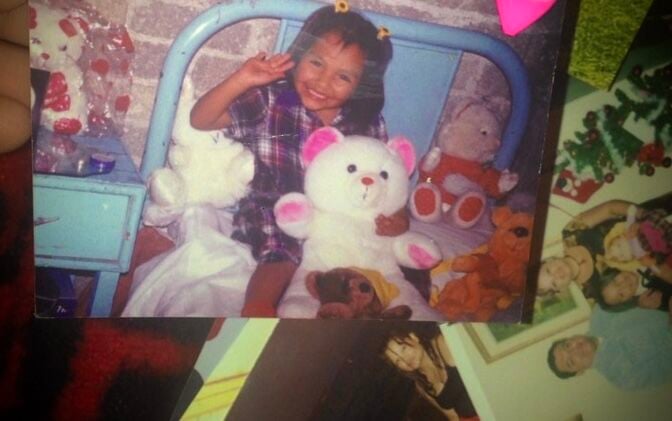
Brenda at 4-years-old in Mexico City. Photo courtesy of Brenda Verano
For the first time in my 26 years of life, I will be starting therapy. Excited, nervous and scared are just some of the many emotions that this new journey ignites within me, as an immigrant, queer Latina living in Los Angeles.
I began learning about the brain in my high school’s AP psychology course. I learned the way the frontal lobe is responsible for a variety of tasks, including emotional regulation, language and personality characteristics. I also learned about one’s unconscious mind and its influence on behavior, specifically how past experiences have great control over how you behave today.
In past years, I have also consumed numerous self-help books and podcasts about self-love, mental health, being present and caring for oneself. As the years have gone by, I’ve acted as my own therapist and at times, my friend's therapist too, holding space for each other and offering the best advice we can.
But I know that although all those practices have gotten me to where I am today, they are not enough anymore.
And while they have been helpful and true reminders for years, the numerous phrases, such as “It is OK to not be OK,” as well as “healing is not linear,” or “you are not your thoughts and emotions,” no longer have the same effect on me as they once did.
My life has had numerous challenges and changes in the last few years and knowing that made me realize that I deserved to seek professional help to successfully process and navigate them. My mind is deserving of that, despite how difficult and unfamiliar the journey of beginning therapy has been.
The most difficult part of seeking therapy was finding a facility that accepted new clients. In the past two months, I made various calls to mental health facilities and centers in L.A. County, many of which were recommended by friends or that I found out about during my own research. Many of the centers I contacted said they were at full capacity. One of them said they were not taking on new clients until six to eight months from now due to the lack of funding they have been experiencing. Others simply never called me back after I lefta voice message on their voicemail and/or sent them an email. Other centers had a full voicemail inbox, where no new messages could be received.
According to the California Health Care Foundation, one in six Californians, or over 6 million people, experiences a mental health disorder in any given year. Still, access to this care is not always easy. Despite the high prevalence of mental health issues, there is a significant gap in access to care. Roughly 60% of adults with a mental illness in California do not receive any mental health services.
Seeking therapy is not an easy experience and it can be even harder if no one in your immediate family has ever gone through therapy, or like in my family, mental health has been a taboo topic.
For me, detaching from parentification and inter-generational dilemmas and conflicts surrounding therapy has been one of the hardest things to overcome.
My mother immigrated to the United States when she was 30 years old and independently navigated a new life, country and culture without assistance.

My mother and I. (2024) Photo courtesy of Brenda Verano
When I first suggested therapy to my mom as a way to help her navigate some of her own emotions and everyday stress, she told me that was a luxury she had no time for. My mother, who works 40 to 45 hours a week Monday through Friday, has done everything on her own. I do not recall my mother ever asking for help from her siblings, parents, friends or even less, a mental health expert or therapist.
For many immigrant parents like my own, therapy is looked at as a luxury that is not necessary as long as you just push forward, te pones las pilas, and get through it on your own. Negative stigma has also clouded practices like therapy. Many parents are focused on the “¿Qué dirán” or the worry of what others might say knowing you’re in therapy.
Personally, the idea that I struggled with the most was the fear that if I sought therapy, my parents would think they did not do enough for me. As an only child, I feared they would think that somewhere along the way they were not able to help me, or that they dropped the ball and that's why I came to therapy, when that is the furthest from the truth.
Today, I stopped trying to win any of my parents over when it comes to the importance of therapy. I continue my own path in seeking professional help because I know it is important. This is the gift I give to myself, to my parents and to the future kids in my family … to learn that therapy is not a sign of weakness but of bravery and enrichment.
Finding an affordable and culturally competent therapist has also been a struggle in its own. Therapy in Los Angeles can range from $100 to 300 an hour, and for people without health insurance like myself, these out-of-pocket costs can add up rapidly. Through my research, I found Open Path Collective, a nonprofit network of psychotherapy professionals, that offers discounted services to members, with sessions costing approximately $40 to $70.
I began looking for Latina female therapists or therapists of color. For many of us who are stepping into therapy for the first time, we want to come in fully as ourselves and not worry if our therapist is going to understand our family dynamics and the immigrant experience or if I will need to explain and educate my therapist about these issues.

Ready for my first in-take session to begin. Photo by Brenda Verano
At first, I wondered if that was too much to ask for and if I had to reevaluate and bring down the standards I set for finding a therapist. I was looking for someone who was not only skilled in counseling and different therapy practices but also someone who was aware of their own worldviews, knowledgeable about diversity and trained to connect with different types of clients.
It's OK to want that. A mentor and friend once told me that therapy can be like dating, where you meet with different therapists and talk about their skills and expertise, their treatment orientation and their specific backgrounds until you find the one that you are best compatible with and that is compatible with you.
One very helpful tip was to take advantage of an initial consultation. This is where they will ask you what you would like to work on in therapy and gather some background information about you and your family, but this is also where you can ask all your questions about not only their practices but also about their values on issues like social justice, equity and anything else you are curious about or that you need to feel comfortable with.
Many times, my mental health has taken a back seat in my life. I’ve prioritized things like my job or my financial stability. Although those are important, I know I can’t be as present or fully emerged into any of those things if I am not OK mentally and emotionally.
I know that making my mental health a priority will be challenging, emotionally, financially and even socially. But I also know that my future self will thank me for it and that, more than anything, makes me so excited to begin this new chapter.










(0) comments
Welcome to the discussion.
Log In
Keep it Clean. Please avoid obscene, vulgar, lewd, racist or sexually-oriented language.
PLEASE TURN OFF YOUR CAPS LOCK.
Don't Threaten. Threats of harming another person will not be tolerated.
Be Truthful. Don't knowingly lie about anyone or anything.
Be Nice. No racism, sexism or any sort of -ism that is degrading to another person.
Be Proactive. Use the 'Report' link on each comment to let us know of abusive posts.
Share with Us. We'd love to hear eyewitness accounts, the history behind an article.